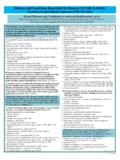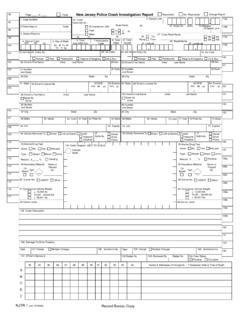Transcription of SOUTH GAUTENG HIGH COURT, JOHANNESBURG …
1 REPUBLIC OF SOUTH AFRICA. SOUTH GAUTENG high court , JOHANNESBURG . CASE NO: 11/33767. DATE: 23/09/2011. reportable . (1) reportable : YES / NO. (2) OF INTEREST TO OTHER JUDGES: YES/NO. (3) REVISED.. DATE SIGNATURE. In the matter between: EAST ROCK TRADING 7 (PTY) LTD First Applicant DESPOTUSIC; VJEKOSLAV Second Applicant and EAGLE VALLEY GRANITE (PTY) LTD First Respondent VAN OVERBERGHE; DERK GHISLAIN MAUIRCE Second Respondent VANERNEWYCK; PHILIPE VICTOR ROBERT Third Respondent PHANA INVESTMENT 95 (PTY) LTD Fourth Respondent JUDGMENT. 2. NOTSHE AJ: [1] The Applicants brought a two part urgent application. Part A seeks an interim relief pending the finalization of Part B of the application. [2] Part A seeks to stop the holding of a meeting of the Board of Directors of the First Respondent scheduled to be held in Brits at 10h00 on 14.
2 September 2011 and also any other meeting of Board of Directors of the First Respondent in which certain resolutions were to be tabled. [3] The Respondents opposed the application on the grounds that the matter was not sufficiently urgent to be heard as an urgent application. The Respondents also dispute that the Applicants have satisfied the requirements for the granting of an interim interdict. URGENCY. [4] In a nutshell the Respondents aver that the Applicants have delayed in instituting the proceedings. They aver that the Applicants have known of the intended meeting for some time. It is then argued that as a result thereof they created their own urgency. [5] The issue of whether a matter should be enrolled and heard as an urgent application is governed by the provisions of 6(12) of the Uniform Rules.
3 The aforesaid sub rule allows the court or a Judge in urgent applications to dispense with the forms and service provided for in the 3. rules and dispose of the matter at such time and place in such manner and in accordance with such procedure as to it seems meet. It further provides that in the affidavit in support of an urgent application the applicant shall set forth explicitly the circumstances which he avers render the matter urgent and the reasons why he claims that he could not be afforded substantial redress at a hearing in due course.. [6] The import thereof is that the procedure set out in rule 6(12) is not there for taking. An applicant has to set forth explicitly the circumstances which he avers render the matter urgent.
4 More importantly, the Applicant must state the reasons why he claims that he cannot be afforded substantial redress at a hearing in due course. The question of whether a matter is sufficiently urgent to be enrolled and heard as an urgent application is underpinned by the issue of absence of substantial redress in an application in due course. The rules allow the court to come to the assistance of a litigant because if the latter were to wait for the normal course laid down by the rules it will not obtain substantial redress. [7] It is important to note that the rules require absence of substantial redress. This is not equivalent to the irreparable harm that is required before the granting of an interim relief.
5 It is something less. He may still obtain redress in an application in due course but it may not be substantial. Whether an applicant will not be able obtain substantial redress in an application in due course will be determined by the facts of each case. An applicant must make out his cases in that regard. 4. [8] In my view the delay in instituting proceedings is not, on its own a ground, for refusing to regard the matter as urgent. A court is obliged to consider the circumstances of the case and the explanation given. The important issue is whether, despite the delay, the applicant can or cannot be afforded substantial redress at a hearing in due course. A. delay might be an indication that the matter is not as urgent as the applicant would want the court to believe.
6 On the other hand a delay may have been caused by the fact that the Applicant was attempting to settle the matter or collect more facts with regard [9] It means that if there is some delay in instituting the proceedings an Applicant has to explain the reasons for the delay and why despite the delay he claims that he cannot be afforded substantial redress at a hearing in due course. I must also mention that the fact the Applicant wants to have the matter resolved urgently does not render the matter urgent. The correct and the crucial test is whether, if the matter were to follow its normal course as laid down by the rules, an Applicant will be afforded substantial redress. If he cannot be afforded substantial redress at a hearing in due course then the matter qualifies to be enrolled and heard as an urgent application.
7 If however despite the anxiety of an Applicant he can be afforded a substantial redress in an application in due course the application does not qualify to be enrolled and heard as an urgent application. 1. See: Nelson Mandela Metropolitan Municipality v Greyvenouw 2004 (2) SA 81 (SE) at 94C D;. Stock v Minister of Housing 2007 (2) SA 9 (C) 12I 13A. 5. [10] In this matter the Applicants have explained that despite receiving the notice of the meetings the Second Applicant was travelling and no one else could depose to the affidavit. An attempt was even made for their attorney to meet him in some other countries outside SOUTH Africa. [11] In addition thereto, despite the delay, it is clear that the matter remains urgent.
8 The Respondents intend to hold a meeting whereby important decisions are to be discussed. It is clear that if the Applicants were to wait and bring the matter in the normal course they will not be able to be afforded substantial redress at a hearing in due course. The horse would have bolted out of the stable by then. [12] In the circumstances I am satisfied that the matter is sufficiently urgent to be enrolled and heard as an urgent application. INTERIM INTERDICT. [13] An interim interdict is a court order preserving or restoring the status quo pending the determination of rights of the parties. It is important to emphasize that an interim interdict does not involve a final determination of these rights and does not affect their final determination.
9 In this regard the Constitutional court said the following:2. An interim interdict is by definition 'a court order preserving or restoring the status quo pending the final determination of the rights of 2. In National Gambling Board v Premier, Kwa-Zulu Natal and Others 2002(2) SA 715 CC. 6. the parties. It does not involve a final determination of these rights and does not affect their final determination.' The dispute in an application for an interim interdict is therefore not the same as that in the main application to which the interim interdict relates. In an application for an interim interdict the dispute is whether, applying the relevant legal requirements, the status quo should be preserved or restored pending the decision of the main dispute.
10 At common law, a court 's jurisdiction to entertain an application for an interim interdict depends on whether it has jurisdiction to preserve or restore the status quo. 3. [14] The requirements for the granting of an interim interdict are well known. The decisions are legion. The requirements are the following: a prima facie right, a well grounded apprehension of irreparable harm if the interim relief is not granted and the ultimate relief is eventually granted, that the balance of convenience favors the granting of an interim relief, and that the applicant has no other satisfactory remedy. 4 In this regard Holmes JA5 said the following: The granting of an interim interdict pending an action is an extraordinary remedy within the discretion of the court .














